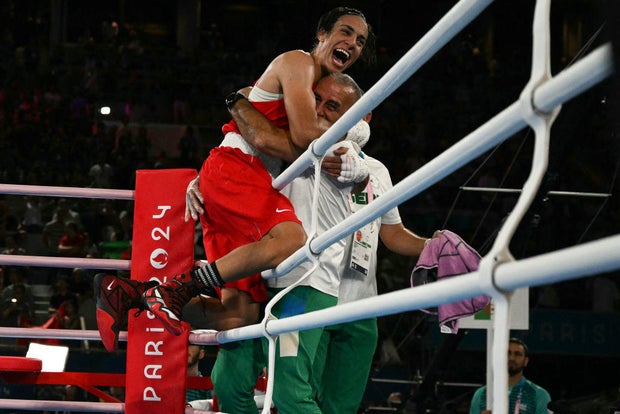CBS News
Algerian boxer Imane Khelif wins gold in Paris Olympics following gender misconceptions

Algerian boxer Imane Khelif has won a gold medal Friday at the Paris Olympics, emerging as a champion from a tumultuous run at the Games where she endured intense scrutiny in the ring and online abuse from around the world over misconceptions about her womanhood.
Khelif beat Yang Liu of China 5:0 in the final of the women’s welterweight division, wrapping up the best series of fights of her boxing career with a victory at Roland Garros.
Cheering crowds embraced Khelif in Paris — draping themselves in Algerian flags and chanting her name — even as she faced an extraordinary amount of scrutiny from world leaders, major celebrities and others who have questioned her eligibility or falsely claimed she was a man. It has thrust her into a larger divide over changing attitudes toward gender identity and regulations in sports.
MOHD RASFAN/AFP via Getty Images
Khelif told SNTV, a sports video partner of The Associated Press, last weekend that the wave of hateful scrutiny she has received “harms human dignity,” and she called for an end to bullying athletes. She also said a gold medal would be “the best response” to the backlash against her.
The scrunity stems from the Russian-dominated International Boxing Association’s decision to disqualify Khelif and fellow two-time Olympian Li Yu-ting of Taiwan from last year’s world championships, claiming both failed a murky eligibility test for women’s competition.
The International Olympic Committee took the unprecedented step last year of permanently banning the IBA from the Olympics following years of concerns about its governance, competitive fairness and financial transparency. The IOC has called the arbitrary sex tests that the sport’s governing body imposed on the two boxers irretrievably flawed.
The IOC has repeatedly reaffirmed the two boxers’ right to compete in Paris, with President Thomas Bach personally defending Khelif and Lin while calling the criticism “hate speech.”
“We have two boxers who are born as women, who have been raised as women, who have a passport as a woman and have competed for many years as women,” Bach said.

That hasn’t stopped the international outcry tied to misconceptions around the fighters that has been amplified by Russian disinformation networks. It also hasn’t slowed two boxers who have performed at the highest levels of their careers while under the spotlight’s glare.
Khelif’s gold medal is Algeria’s first in women’s boxing. She is only the nation’s second boxing gold medalist, joining Hocine Soltani (1996).
Hundreds of flag-clad, loud supporters of Khelif crowded the paths through the famed Roland Garros tennis complex in Paris and packed the stands, chanting, cheering and waving Algerian flags. Khelif also has become a hero across her North African country where many fans have seen the world’s dissection of Khelif as criticism of their nation.
Khelif’s fight was dubbed “The Night of Destiny” in local newspapers. Projection screens to watch the bout were set up in public squares throughout Algiers and other cities. In the city of Tiaret, in the region where Khelif is from, workers braved scorching summer heat to paint a mural of Khelif on the gym where she learned to box.
“Imane has managed to turn the criticism and attacks on her femininity into fuel,” said Mustapha Bensaou of the Tiaret gym. “The slander has given her a boost. … It’s a bit of a blessing in disguise.”
The gold medal fight is the culmination of Khelif’s nine-day run through an Olympic tournament that began with a bizarre event. Khelif’s first opponent, Angela Carini of Italy, abandoned their bout after just 46 seconds, saying she was in too much pain from Khelif’s punches.
An already brewing story suddenly became major international news, with the likes of former President Donald Trump and “Harry Potter” author J.K. Rowling weighing in with criticism and false speculation about men competing with women in sports. Italian Premier Giorgia Meloni personally visited with Carini to share her condolences and to cast doubt on Khelif’s eligibility.
Carini later said she regretted her actions and wished to apologize to Khelif. The Italian newspaper La Stampa detailed Carini’s mindset in the days leading up to the bout, describing pressure from both inside and outside her team to avoid the fight amid the growing speculation over Khelif’s status.
Khelif has never done as well in another international tournament as she did in these Olympics. When she was cast as some sort of unstoppable punching machine last week by pundits and provocateurs who had never seen her fight before, opponents and teammates who know her were shocked by the characterization.
Then she lived up to the notion of being one of the best Olympic boxers in the world.
The banished governing body for boxing did nothing to help its argument about her disqualification at the world championships last year during a shambolic news conference in which its leadership contradicted itself about the tests and declined to answer basic questions about them, citing privacy concerns from the Olympic committees of Algeria and Taiwan.
Lin also fights for a gold medal Saturday on the final card of the Olympics. She takes on Julia Szeremeta of Poland with a chance to win Taiwan’s first boxing gold.
CBS News
California declares emergency after severe U.S. case of H5N1 bird flu

Watch CBS News
Be the first to know
Get browser notifications for breaking news, live events, and exclusive reporting.
CBS News
French man sentenced for drugging ex-wife and facilitating her rape by dozens of men

Watch CBS News
Be the first to know
Get browser notifications for breaking news, live events, and exclusive reporting.
CBS News
Discovery of “tipped over” black hole surprises NASA scientists

NASA researchers combined years of data and new imaging techniques to learn more about a “tipped over” black hole that is moving in an unexpected way.
The black hole is located in a galaxy called NGC 5084. Researchers have been aware of the galaxy for years, NASA said in a news release.
New analysis techniques developed at NASA’s Ames Research Center in California helped researchers see four long plumes of plasma emanating from the galaxy. Most galaxies don’t have plumes, and when they do, only one or two are present. The plumes suggested the galaxy might house a supermassive black hole, NASA said. Spotting both pairs, which formed an “X” shape, led researchers to focus more on the area.
Using archived data from NASA’s Hubble Space Telescope and the Atacama Large Millimeter/submillimeter Array Telescope based in Chile, researchers found that the galaxy also had a “small, dusty inner disk” rotating at the center of the galaxy, again suggesting a black hole there. Even more surprisingly, both the disk and black hole were rotating at a 90-degree angle relative to the rest of the galaxy, meaning both features are essentially “lying on their sides,” NASA said.
NASA/STScI, M. A. Malkan, B. Boizelle, A.S. Borlaff. HST WFPC2, WFC3/IR/UVIS.
“It was like seeing a crime scene with multiple types of light,” said research scientist Alejandro Serrano Borlaff, who will also publish a paper about the discovery, in the news release. “Putting all the pictures together revealed that NGC 5084 has changed a lot in its recent past.”
It’s not clear what caused the change in the galaxy. It may have collided with another galaxy and formed a chimney of superheated gas, creating the X-shaped plasma plumes. Further research will have to be conducted to learn more about the circumstances.
“Detecting two pairs of X-ray plumes in one galaxy is exceptional,” said Pamela Marcum, an astrophysicist at Ames and co-author on the discovery, in the news release. “The combination of their unusual, cross-shaped structure and the ‘tipped-over,’ dusty disk gives us unique insights into this galaxy’s history.”










